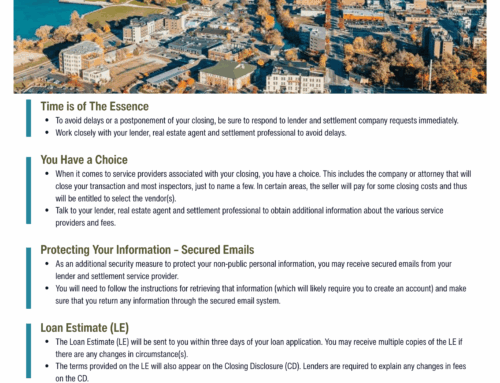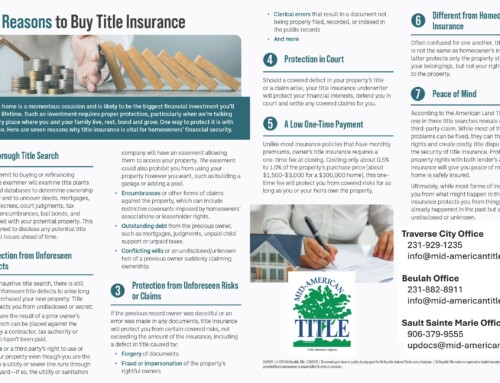Buying and selling a home is an exciting time, but there can be pitfalls for unsuspecting consumers . We want home buyers ,sellers, agents, and lenders to be aware that criminals are using wire fraud schemes to steal money meant for home purchases or the proceeds from the sale of the property.
Watch this video for four tips to protect your money and advice for what to do if you’ve been targeted by a scam.
Criminals begin the wire fraud process way before the attempted theft occurs. Most often, they begin with a common social engineering technique called phishing. This can take the form of email messages, website forms or phone calls to fraudulently obtain private information. Through seemingly innocuous communication, criminals trick users into inputting their information or clicking a link that allows hackers to steal login and password information.
Phishing emails might appear to come from a legitimate business or recognized user. Spear phishing is
a more targeted email attack sent to a select number of users, while a whaling attack, also known as Business Email Compromise (BEC), is a more targeted variation of spear phishing aimed at high-profile executives or personnel who manage wire transfers. According to the latest Association for Financial Professionals’ Payments Fraud and Control Survey, a majority of finance professionals (64 percent) reports that their organizations were exposed to BEC in 2015. The FBI’s Internet Crime Complaint Center reports that “the BEC scam continues to grow, evolve and target businesses of all sizes.” Since January 2015, there has been a 1,300 percent increase in identified losses, now totaling over $3 billion.
The best way to avoid being exploited is to verify the authenticity of requests to send money by walking into the CEO’s office or speaking to him or her directly on the phone. Don’t rely on email alone.
Martin Licciardo, a special agent in the FBI’s Washington Field Office, said the best way to avoid getting ripped off is to verify the authenticity of requests by speaking to people directly.
“The ability of these criminal groups to compromise legitimate business e-mail accounts is staggering,” he said. “They are experts at deception.”
It is disconcerting that, in spite of safeguards being implemented, criminals are still making headway with BEC scams. The significant increase in wire fraud also suggests that BEC fraud may be more difficult to prevent than was previously believed.
Once hackers gain access to an email account, they will monitor messages to find someone in the process of buying a home. Hacks can come from various parties involved in a transaction, including real estate agents, title companies, attorneys or consumers. Criminals then use the stolen information to email fraudulent wire transfer instructions dressed up to appear as if they came from the victim. To this end, criminals will use either the victim’s actual email account (which they may actually control) or create a fake email account resembling the victim’s email.
“We all want to avoid the scenario where the buyer’s funds are sent to a fake account and are unrecoverable,” said Bill Burding, a member of ALTA’s Information Security Committee and general counsel for Orange Coast Title Co. “One of the key indications of any wire fraud scam is the sense of urgency. These tend to come from someone of authority to the person who is responsible for wiring funds within the organization. This is when it’s imperative to slow down and make sure policies for handling wire instructions are followed to a T.”
Over the past few years, there’s been a lot of discussion and training over the past few years about preventing outbound wires from being intercepted. According to Christopher Hacker, chief product officer at ShortTrack, criminals are now targeting the “inbound wire” of cash to close sent by the buyer.
“Unfortunately, again and again, we hear leaders of title agencies say they’re handling all of the wire diversion and fraud issues with the controls for outbound wires,” Hacker said. “The bad actor sits and waits for the wire instructions to show up in the buyer’s inbox, downloads them, deletes the message with the accurate document and resends updated wire instructions either from a spoofed account of the title company or from the compromised account of the real estate agent.”
If you would like more indepth training on protecting yourself from Wire Fraud & Cyber Crime contact us today!
Some Examples of Fraudulent Emails
Here are a couple of examples of the types of email you may receive from criminals attempting to steal funds for a real estate transaction.
Sometimes the email address looks correct, but the “reply-to,” which isn’t displayed in most email programs, can be masked or undisclosed, and can lead to unfamiliar or personal email domains. Note the use of the gmx.com domain, which is notorious in this type of scheme.
From: [Name] <[actual email address]>
To: Details
Hello,
Please I need you to do a quick wire transfer to a local bank for me. Get back at me with the info you need to do the wire transfer.
Here’s an example of a spoofed inter-office email attempting to get an employee to change wiring information.
From: [Name] <[name]@gmx.com>
To: [Internal Employee email]
Subject: Urgent – proceeds
[First Name],
Seller wants proceeds wired to their trading account how can you help?
In the following example, the agent had an email address that incorporated the company domain, but the “from” was a Gmail address designed to make the recipient think it was a legitimate correspondence. In addition, two digits of the phone number in the email signature line were transposed.
From: [Agent Name] <[agent-name]@gmail.com>
To: [Client]
Subject: Urgent – regarding [Listing Address] [First Name],
To move forward on [address] we need to have the money wired immediately. Once you wire [amount] to [wiring instructions] I will call you. I am in a meeting and will not be available to talk until I call you later.







